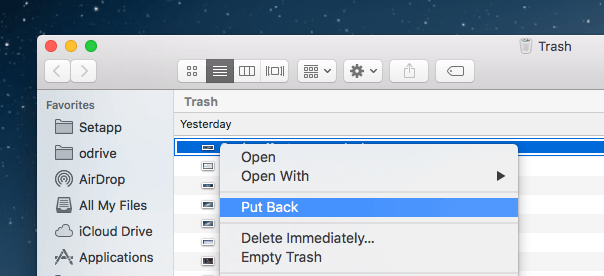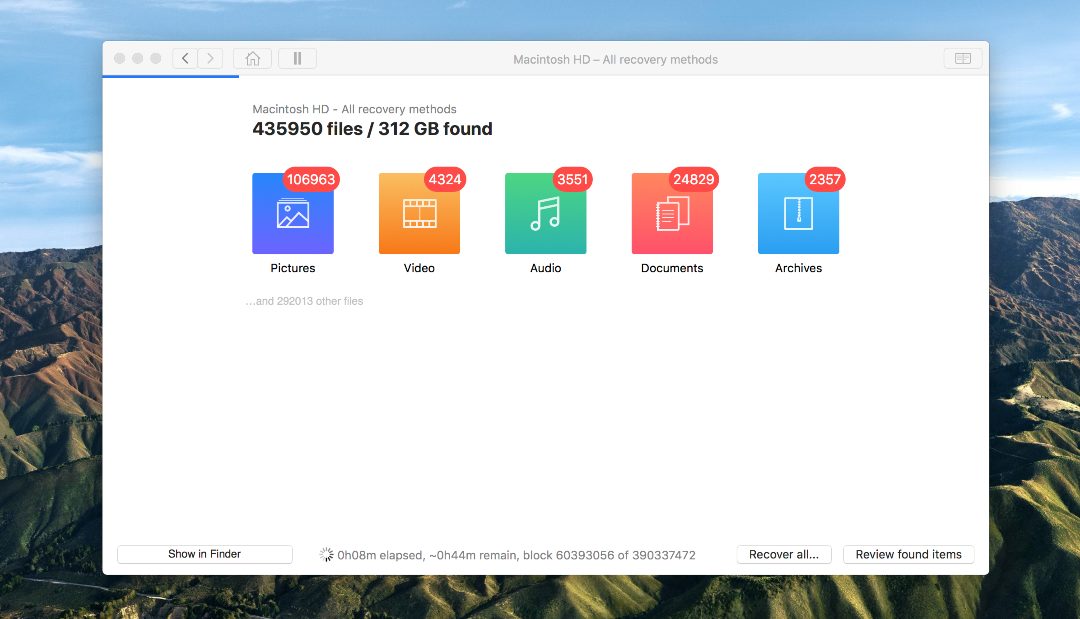EaseUS Data Recovery Wizard for Mac is specially designed for Mac owners to recover a wide range of lost data files, which can be accidentally deleted, or disappeared because they formatted or corrupted their Mac hard drive. The advantages of using software to retrieve files not in the trash bin anymore are basically as follows.

- Super easy, fast, and full automation
- Powerful enough due to advanced technology in scanning and reconstructing data
- Nothing is required for users but a simple click of download and install the software on their MacBook or iMac

Speaking of the disadvantages? The free offer is file size limited, and you must upgrade to a pro version for full file recovery. Nonetheless, everyone can start with the free program for a full preview of found pictures, documents, or videos before recovery. In case you'll change your mind after noticing the great advantages of using software to get data back on Mac, we demonstrate a simple user guide here for you.

Step 1. Select the location where your important data & files were deleted and click the 'Scan' button.
How To Recover Trash Can
Step 2. The software will run both quick scan and deep scan and work hard to find as many deleted files as possible on the selected volume.
- Beyond Trash, you need a Mac data recovery software for file recovery. There is always a huge mileage when you have a free data recovery software for your Mac. One such software is Stellar Data Recovery Free Edition for Mac which offers 1 gigabyte of free data recovery. It ships with stellar features with a few caveats on the Free Edition, that.
- To recover found files deleted by Empty Trash command, check the box before the files and click the 'Recover' button on the right bottom of the window. Or click 'Recover' in the preview dialog, then choose an output folder and click 'OK' to undo the emptied Trash operation.
Step 3. The scan results will be displayed in the left pane. Just select the file(s) and click the 'Recover' button to get them back.
Solution #1: Try to Recover Deleted Folders from a Trash Bin. Unless you press Option + Command + Delete on your keyboard or select the Delete Immediately option from the File menu in Finder (available only when you hold the Option key), deleted folders on Mac are moved to Trash, where they sit until you empty Trash or recover them.
Without Software Solutions: How Do You Recover Deleted Files on Mac?
Though Mac data recovery software is available to recover deleted files on HDD, external USB drive, SD card, or fusion drive on a MacBook and iMac device, it is still good to command the knowledge of how to recover deleted files on Mac without software.

Solution 1. Recover Deleted Files from Mac Trash Bin
Good for: Undo recently deleted files; Simple and temporary deletion
The Trash Bin, or simply Trash or Bin, contains all deleted items you removed, including drag and drop a file onto the Trash icon on the Dock, Control-click a file and then choose Move to Trash, or select a file and press Command (⌘) and Delete keys. Any of the three methods send your files and folders to the Trash Bin.
Trash Bin keeps the deleted items for a short period of time, usually 30 days, after then the files are automatically removed. Therefore, try to retrieve files from Mac Trash as soon as possible.
Step 1. Locate the Trash icon and open it.
Step 2. To filter specific files or folders you want to recover, you can manually look for the files by names or directly use the Search feature with either a file name or a certain file extension.
Step 3. Press and hold the Command key and click on the target file, and use the Put Back option to recover the files to their original locations.

Solution 2. Recover Deleted Files Using Mac Terminal
Good for: Experienced users; Recover deleted files temporarily and permanently
The operation of the macOS Terminal is based on a variety of command lines. What command line is used to retrieve deleted files? Look at the following steps.
Step 1. Follow the path to open the Terminal application on your Mac: Applications >Utilities >Terminal.
Step 2. In the command line, you'll need to enter the command lines each by each:
- cd.Trash: this command is for changing the directory to the hidden Trash folder
- ls: This command is to list all files in the Trash folder
- mv../: This is to move the specified file to the home directory. So, replace the filename with your own deleted file's filename
Step 3. Return to the home directory so you can check the restored files through Terminal.
How To Recover Deleted Trash On Mac For Free Mac
What Else Can You Do to Recover Mac Deleted Files?
How To Recover Deleted Trash On Mac For Free
Regarding the topic 'How to recover deleted files on Mac without software', we basically demonstrate two ways with a step-by-step guide, including restoring from the Trash Bin and using the Terminal method. Both solutions are good to deal with the recently deleted files on all the major macOS versions, like Monterey, Big Sur, Catalina, Mojave and so on.
Accidentally Emptied Trash Mac
As a matter of fact, there are other solutions to deleted file recovery on Mac. For example, restore from the Time Machine backup as long as you create timely backups of essential data files through Time Machine. Of cause, if all the manual ways failed to help you recover the lost files, do not hesitate the try the all-around EaseUS Mac data recovery software, which can tackle 100+ cases of data loss scenarios and disasters even though you cannot boot the Mac operating system at all. The sooner you try, the less pain you'll suffer.